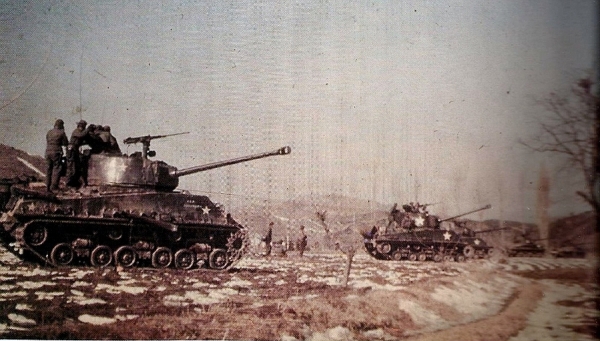The Cold War - The Korean War
 In mid-March the U.N. forces launched a counter-strike in answer to the Communists offensive that was commenced across a wide swath of the front line in early January. General Ridgeway remarked that although the Communists were in retreat, they still had an enormous pool of men in reserve. Nine months after the American intervention into the Korean War, the Congress saw reason to expand the draft pool to an even wider degree:
"Eighteen-year-olds were a little closer to the draft this week, and America was a step closer to a system of permanent universal military training..." "The very first engagement of the conflict, when the North Koreans crushed South Korean defenses at the 38th parallel, demonstrated the superiority of the North Korean Army. On June 28, three days after the opening attack, a tank/infantry force leading the main North Korean thrust entered Seoul... In the face of the onslaught, the South Korean Army retreated, leaving most of its equipment behind. Whatever effectiveness it may have possessed was already lost." General MacArthur's wish to expand the Korean War by dropping as many as thirty (30) A-Bombs on various strategic targets located in both China and North Korea contrasted dramatically with President Truman's plans as well as those of the United Nations. Plagued by a crippling sense of self-grandeur, the General's arrogance became a liability and President Truman was absolutely delighted to fire him.
"Had the five-star general, brilliant military servant of his country for 50 years, been a sincere, farsighted prophet advocating the only course which could halt Communist Imperialism and save the free world? Or had he been an egotistical, arbitrary, insubordinate soldier, deliberately undercutting his Commander-in-Chief in pursuit of a policy to which no United States or United Nations official would give endorsement?"
The author lists numerous instances indicating that the General had been insubordinate. The two-round, all-out offensive launched by the Chinese Army on April 22 exhausted itself and fizzled-out four weeks later after suffering heavy losses and gaining no ground whatever. |
MORE ARTICLES >>> PAGE: * 1 * 2 * 3 * 4 * 5 * 6 * 7 * 8 * 9 * 10 * 11 * > NEXT |
|